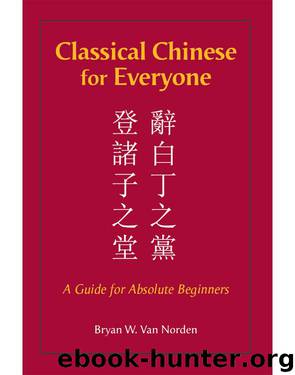Classical Chinese for Everyone by Van Norden Bryan W.;

Author:Van Norden, Bryan W.;
Language: eng
Format: epub
Publisher: Hackett Publishing Company, Incorporated
Published: 2019-09-10T16:00:00+00:00
6.3.5. Unmarked Subordination
In both English and Chinese, grammatical subordination of one phrase to another is often marked by a conjunction, like 如 rú, “if,” or 雖 suī, “although.” However, both languages also have contexts in which subordination is unmarked, usually for rhetorical or poetic purposes. Think of Caesar’s famous “I came, I saw, I conquered.” What he really means is, “I came, and then I saw what was there, and then I conquered it.” More prosaically, in English, “Do the crime, serve the time,” means “if you do the crime, then you will serve the time.” Grammarians call this phenomenon parataxis (when the clauses are coordinate) or hypotaxis (when one of the clauses is subordinate to the other).10
The first two pairs of clauses from the Dào dé jīng illustrate hypotaxis. The first one is equivalent to something like “If 道可道, then 非恆道,” or “道可道, but 非恆道.” We find a similar construction in Analects 8.1:
是可忍也。孰不可忍也。
Shì kě rěn yě. Shú bù kě rěn yě.
忍 rěn s.v., to endure
孰 shú n., what . . . ? (interrogative pronoun)
This can be endured. What cannot be endured?
If this can be endured, then what cannot be endured?
Download
This site does not store any files on its server. We only index and link to content provided by other sites. Please contact the content providers to delete copyright contents if any and email us, we'll remove relevant links or contents immediately.
| Ancient, Classical & Medieval | Anthologies |
| British & Irish | Japanese & Haiku |
| Love Poems | Regional & Cultural |
| Themes & Styles | United States |
| Women Authors |
The Universe of Us by Lang Leav(15079)
The Sun and Her Flowers by Rupi Kaur(14518)
Adultolescence by Gabbie Hanna(8928)
Whiskey Words & a Shovel II by r.h. Sin(8022)
Love Her Wild by Atticus(7759)
Smoke & Mirrors by Michael Faudet(6193)
Wiseguy by Nicholas Pileggi(5789)
The Princess Saves Herself in This One by Amanda Lovelace(4976)
Love & Misadventure by Lang Leav(4848)
Memories by Lang Leav(4801)
Milk and Honey by Rupi Kaur(4749)
Bluets by Maggie Nelson(4559)
Too Much and Not the Mood by Durga Chew-Bose(4349)
Pillow Thoughts by Courtney Peppernell(4284)
Good morning to Goodnight by Eleni Kaur(4234)
The Poetry of Pablo Neruda by Pablo Neruda(4112)
Algedonic by r.h. Sin(4064)
HER II by Pierre Alex Jeanty(3612)
Stuff I've Been Feeling Lately by Alicia Cook(3458)
